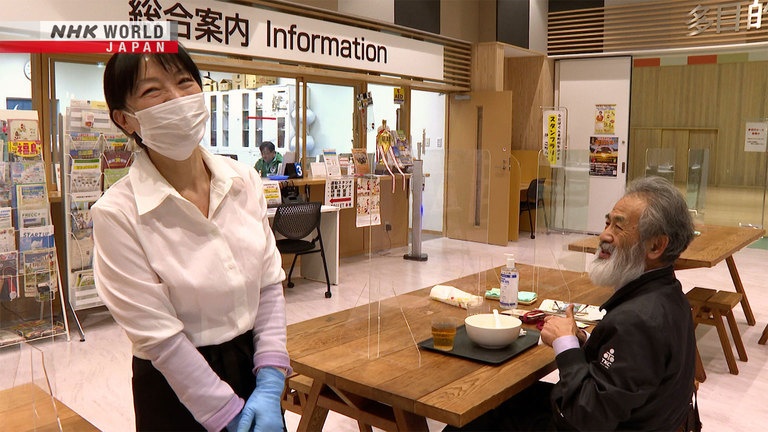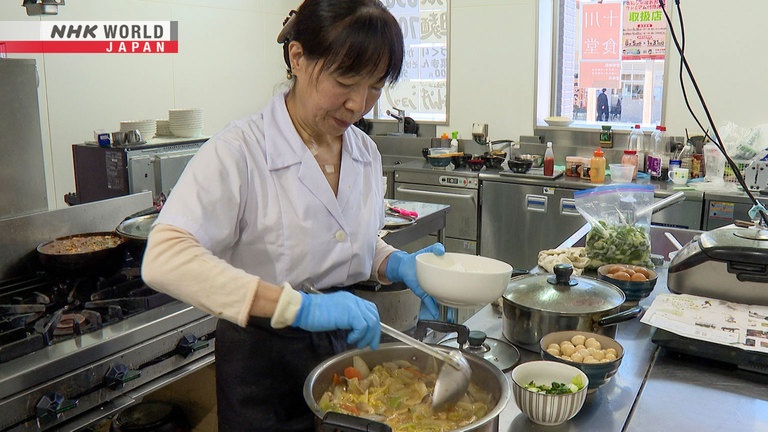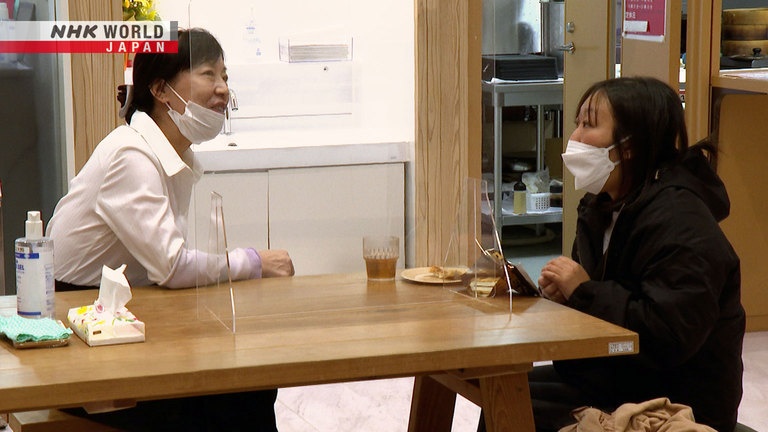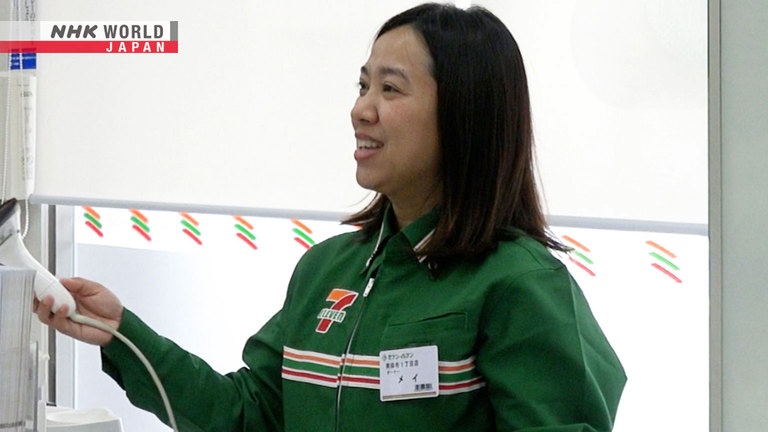A Hearty Recipe for Recovery
This time, we meet Togawa Aya, a naturalized Japanese born in China who runs a cafeteria in Okuma, Fukushima Prefecture, as well as May Zin Chit from Myanmar, who manages a convenience store in Tokyo.




Transcript
Where We Call Home.
In this small town in Fukushima still recovering from the 2011 nuclear disaster is a cafeteria beloved by the locals.
Here you are!
It's run by Togawa Aya, a naturalized Japanese born in China.
She's made invigorating the community with tasty and affordable meals her mission.
To accelerate the town's revival, a new commercial facility is now under construction,
where Aya is planning to relocate her business.
She's working hard to prepare for the upcoming move.
However, she finds it a challenge.
I'm going at full speed,
but I can' keep going on like that.
Aya's determination to support the town's recovery is stronger than ever.
Here's a closer look at her efforts.
Okuma in Fukushima faces the Pacific Ocean.
The town is working to recover from the impact of the 2011 nuclear accident.
On March 11th that year,
a massive earthquake and tsunamis in east Japan caused a meltdown in the Fukushima Daiichi Nuclear Power Plant.
All eleven thousand residents of Okuma had to evacuate.
Eight years later, efforts began to support the citizens' return in areas deemed safe to inhabit.
The local government built this facility as a base of operations for the town's recovery.
Managed by a private organization, it houses a convenience store, sports gym and community center.
It's also home to a popular cafeteria.
Hi!
Here you are.
Togawa Aya, born Bi Caiqin in her native China, manages the place alone.
She opened it in 2022.
She prepares all the dishes herself.
Her cooking's great taste and low prices have made her business a hit.
Not to mention the generous portions she serves.
Here you are!
Wow!
So big!
Curry and rice with a large piece of fried chicken cutlet, for only a little more than five US dollars.
Still recovering, the town counts very few restaurants.
For people who live and work here, Aya's cafeteria is invaluable.
I eat here every day.
I never get tired of it. It's delicious.
Ramen, soba, curry, and "mapo" tofu rice.
I order those in rotation.
I don't care much about profits.
If the customers are happy, so am I.
Customers are my number one priority.
Nothing makes me happier than hearing
them say, "It's delicious!"
and to know they're satisfied.
It's so rewarding.
Aya grew up in a poor village in inland China.
She left her hometown, got married, gave birth to her daughter at the age of twenty-seven, but divorced soon after.
In 1997, to earn enough money to raise her child, she moved to Japan alone.
While working as a cook in a hotel in Hokkaido, she found a dream she wished to pursue.
I wanted to run a small restaurant
my own way.
It'd be wonderful.
Then in 2019, she heard from someone involved in recovery efforts in Okuma
that the town was in desperate need of restaurants.
Aya made up her mind.
She applied to a program that supported entrepreneurs wishing to open independent eateries in Okuma,
and eventually was able to have her own cafeteria here.
The fully equipped kitchen is provided by the town.
In addition to utilities, Aya pays a seventy-dollar monthly rent.
Now a year in operation, Aya's cafeteria has become a gathering spot for the local residents.
I said we'd come a month later,
but here we are!
Yummy?
This mother raises her two children alone.
Worried for her future when she moved here last April,
she came to the cafeteria and soon became friends with Aya.
She's so friendly.
I started to come here regularly.
We even go to the public bath together.
I'm usually quite reserved, but thanks
to Aya's character, I could open up.
This Nepalese woman works for the facility's administration.
When Aya is too busy, she helps with washing dishes.
She's like my auntie.
She's always cheerful
and says, "Don't worry."
I want to be like her.
It's been a long time!
Though he left Okuma to live in Nagano after the disaster, this tax accountant drops by whenever he's in town.
Some of us have left Okuma.
But she came here and works hard.
I can't do much, but I root for her.
Just give me ¥600.
You had to do a TV interview today.
- So, I give you a discount.
- Thanks!
I won't say no to a discount!
Aya usually finishes her work after ten o'clock at night.
Remaining true to her mission of serving hearty meals to hungry Okuma residents,
she keeps her shop open until late, seven days a week.
She cooks dinner at home, her first meal of the day.
A simple dish of udon noodles with leftovers from the cafeteria.
"So simple in contrast to your hard work
for customers."
It's enough for me.
I almost always eat noodles.
To have a full stomach for the next day...
I eat noodles to fill me up.
As she came to Japan and poured her heart and soul into her work in the pursuit of her dream,
Aya has had to make several sacrifices.
She particularly regrets not having been there for her daughter.
When Aya made the big move, she left her then two-year-old daughter Tomomi in China with her own mother.
Later, when Aya obtained Japanese citizenship, she had her daughter come over.
But Tomomi had difficulty adapting to life in Japan, which put a strain on their relationship.
How can I explain it?
She came to Japan during
her rebellious phase.
She wouldn't listen to me.
In China, she must've felt very lonely
without a father or mother.
Her grandmother took great care of her,
but when she died...
my daughter must've felt even lonelier.
When Tomomi finished high school, she soon left her mother.
She now lives in Taiwan with her husband and children.
Aya always looks forward to the photos and videos Tomomi sends her.
These are my grandchildren.
"Do you ever regret moving to Japan?"
To earn a living, I had no choice.
My life in China was difficult.
Back then, there were
fewer opportunities.
It's been four years since efforts to help citizens come back to Okuma have begun.
Housing was built to encourage people to return.
However, only about six hundred people have done so.
The town is building new restaurants and shops to speed up Okuma's recovery.
This December, a new large commercial facility is slated to open near the train station.
Aya decided to relocate her business there.
With hearty and tasty meals, she wants to help restore the town to its former liveliness.
It's her own way to give back to this community that helped her make her dream come true.
Fukushima is like
a second homeland to me.
This is where my dream came true.
I don't make fancy gastronomy.
I'm just happy to serve warm meals
I prepare with tender loving care.
It's the only way
I can give back to Okuma.
One man in particular puts his hopes on Aya.
Fuse Yoshiaki manages the facility where Aya's cafeteria is currently located.
He's helped her with things like the menus and signage for her shop.
Lots of veggies.
Aya's cheerfulness and energy
is contagious to everyone here.
We support her in her new project.
Aya continues to work toward the opening of her new restaurant.
But she's facing a major problem.
Sorry I'm late. I went shopping.
Shopping's important.
Aya runs her cafeteria alone.
She almost never takes a break.
She feels she barely has the strength to keep the business going by herself.
I don't remember what time
I got home two days ago.
I had so much to do. I brought some
work home. It was 11 when I was done.
I'm exhausted.
She knows she won't be able to operate the new restaurant at this pace.
She turned to someone close to her for help.
Her younger brother Linhu in China.
He'd planned to move to Japan last summer. However...
Treated water stored at the Fukushima Daiichi Nuclear Power Plant has started to be released into the ocean.
Aya's brother called off his coming to Japan.
A skilled cook, Linhu would be of great help to his big sister.
Aya has repeatedly been trying to convey her distress to him.
Today, she calls him in hope to convince him.
I'm so busy every day.
I work from early in the morning
until late at night.
I really need your help.
I heard on the news recently that
Fukushima was still contaminated.
Is the food there safe?
Let me ask you.
You really think there's a problem?
I read articles saying
it was harmful to people.
Many people in China are worried.
Of course... how can I put this?
It feels like the news in China
are exaggerating.
You must've heard claims that
tons of people in Fukushima died...
and that all the fish is gone.
None of those things are true.
I'm telling the truth. Trust me.
Alright, I got it.
Now reassured and more positive, Linhu says he'll start preparing to move to Japan.
I'm happy.
I'm really happy my brother's coming.
The noodles he makes
are so long and thin.
If he prepares his famous
"dao xiao mian" knife-cut noodles...
they'll be a hit.
I know everyone will love them.
I'll work hard so people can enjoy
delicious food and be happy.
The new cafeteria is scheduled to open in one year.
In the meantime, there's something Aya has been wanting to do:
visit her daughter and grandchildren in Taiwan.
Hearing her shop would be closed for a while, many customers come to see her.
Thank you for your patronage this year.
Thank you. See you next year.
Yes, see you next year.
After closing her shop, Aya heads to the location of her new restaurant with Yoshiaki.
This new base of operations for Okuma's recovery is also where Aya will be making a fresh new start.
I do this for myself, for my customers,
and for the town of Okuma.
I want to provide cheap, quick, tasty
and warm meals to everyone.
Aya welcomed the New Year
with her daughter and grandchildren.
Hi! I'm May Zin Chit.
From food to daily necessities,
Japanese convenience stores...
offer all kinds of useful products.
Minato, Tokyo
May runs a convenience store
in a business district.
9:00 a.m.
arriving at work.
9:10 a.m.
work starts.
I'm placing orders.
An important part of a general manager's
job is to think of ways for customers...
to want to return to the store.
For example, these warm meals and soups.
On cold days, I make sure to stock
the shelves with plenty of them.
The store carries some 3,000 products.
May displays them thoughtfully.
Here, we place the new releases.
This is the line for the cash registers,
a great spot to display new products.
When the store is busy,
May also works at the cash register.
Lunchtime is busy.
We try to speed things up, but I make
sure to engage customers in conversation.
- A separate bag for your warm food?
- One's enough.
I love attending customers.
In 2008, May came to Japan
to study business management.
My father runs his own factory.
I thought I'd take over
when I returned to Myanmar.
While in college in Japan, she worked
part-time at a convenience store.
It was a lot of fun.
On my days off, customers would ask,
"Where's May? Is she off today?"
It made me so happy.
After graduating, she found work at
this firm that runs convenience stores.
She worked 8 years as a manager,
then in May 2023...
she became the general manager
of a new store.
Becoming general manager meant I had
to take on a lot more responsibilities.
I had to think about
the daily revenue for the store.
I work hard to make sure
business runs smoothly.
Ishihara-san is also a general manager.
When I worked part-time,
he taught me so much.
He's a bit like a father to me.
When I struggle with an issue
at the store...
I often ask him for advice.
Interpersonal relations are
a very important aspect of our work.
Let's say a part-timer made a mistake.
We might want to scold them,
but this is an opportunity...
for that worker and
our mutual trust to grow.
If a worker didn't show up
or arrived late...
I would get angry at them.
But now, I ask, "What happened?"
I try to talk to them first.
She still has much to learn, but I hope
she builds a strong team and is happy.
I also hope she can give me a hand
when I need help.
May's store has a large staff
of workers from Myanmar.
We're 35, all from Myanmar.
But if we hire more,
any nationality is fine.
These are our work schedules.
They're in Burmese, but...
easy words like "stock" and "vacuum"...
are in Japanese.
The soba noodles go here.
Being a general manager
has its own unique rewards.
I give employees their salaries.
I really feel like I support people's lives.
It's the most rewarding.
My treasures are these photos
of my children.
My son is cheeky. He's quite a handful.
My daughter, the youngest, is quiet.
Looking at their photos
charges me up for the day.
Japan is a peaceful and safe country.
I want to continue to live
in Japan with my family.